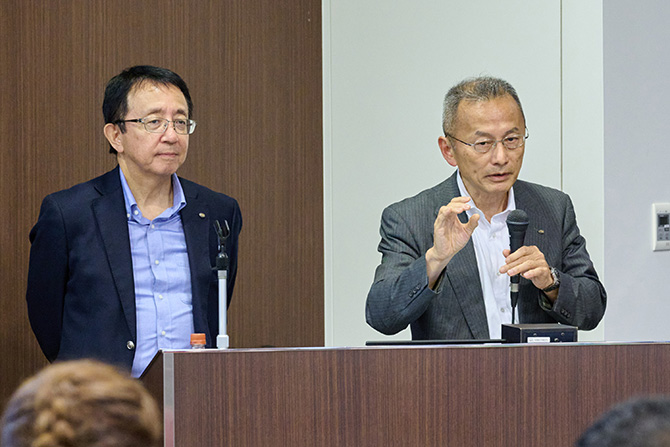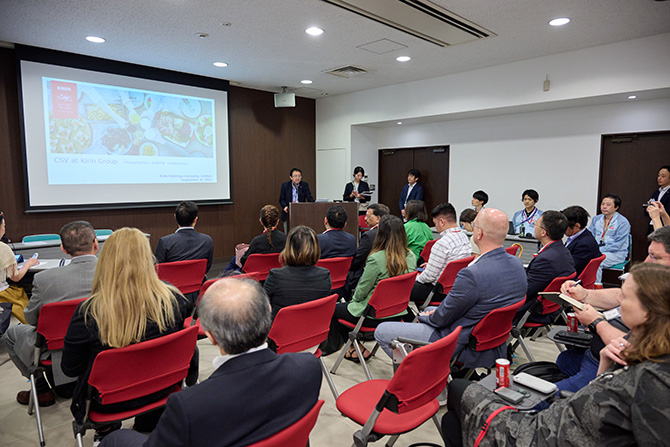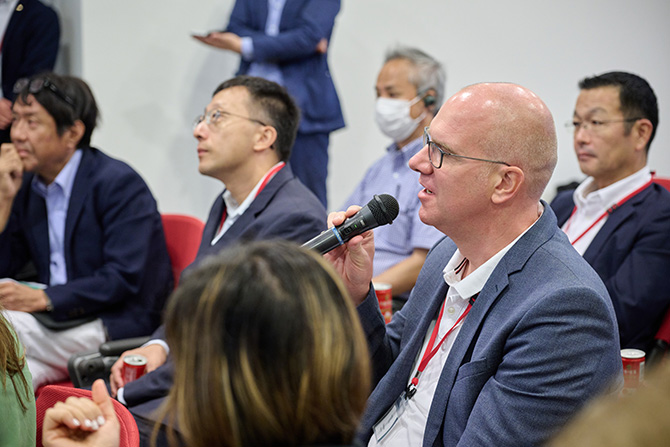The Environment Engagement
In order to accurately grasp the ideal form of the Kirin Group that society expects, such as when we are facing various management issues or revising its policies in pursuit of sustainable growth, we aim to reflect the voices of society in our strategies through stakeholder engagement and to co-create value with society through our business.
This page, we provide selected examples of engagement with international initiatives as the Environment engagement.
Activities to solve the waste plastic problem (Sep 2023)
In order to help solve the problem of plastic waste, the Kirin Group is a member of the Alliance to End Plastic Waste (AEPW), which proposes solutions and supports activities to address plastic waste leakage into the environment and create a circular economy for plastics. As a global non-profit, the Alliance convenes more than 70 companies across the plastic value chain with local communities, civil society groups, intergovernmental organizations, and governments. As the Alliance held a summit on Plastics Circularity in Tokyo, members visited the Kirin Brewery Yokohama factory to present the Kirin Group's philosophy and past initiatives regarding plastic recycling, and to exchange opinions.



Contents
1 Explanation of the Kirin Group's efforts regarding plastics
-
1.Explaining the Kirin Group's CSV management initiatives and integrated approach to the environment
-
2.Case studies related to containers and packaging, mainly explaining chemical recycling initiatives
-
3.Sharing opinions from stakeholders and external organizations regarding the above initiatives
-
4.Introduction of the Packaging Innovation Research Institute and development packages
2 Exchange of opinions
1 Questions and comments from AEPW Alliance members
-
1.Isn't chemical recycling in conflict with existing mechanical recycling efforts?
-
2.How much does chemical recycling cost compared to mechanical recycling?
-
3.Does Kirin develop its own chemical recycling technology, and if so, does it conduct licensing agreements?
2 Answers based on your questions and opinions
-
1.Chemical recycling does not negate mechanical recycling, but we believe that it is important to use it in combination, especially in Japan where the PET bottle recovery rate is over 90%, so mixed operation is important. In addition, there is innovation in the ability to utilize waste plastics that cannot be used mechanically, so there is currently no backlash or negative reaction from mechanical recycling businesses.
-
2.Currently, the cost is high, but we believe this is due to the fact that the scale is still small.We aim to bring the cost to the same level as mechanical recycling by 2027.
Our goal is to establish a chemical recycling factory on our own and expand its scale to realize a better plastic recycling society. -
3.It is not an original development, and there are companies that have already put it into practical use, so they do not hold the license itself. The important thing is that by promoting chemical recycling, we will be able to expand the number of suppliers that supply waste plastics that are unsuitable for mechanical recycling, which have been discarded until now.
The content of these exchanges of opinions has been raised as an issue at group environmental meetings within the Kirin Group, and we will continue to work proactively in the future.
3 others
On the day of the event, in addition to exchanging opinions with AEPW, we also exchanged opinions with the media regarding AEPW and our efforts as an alliance member. The contents are as stated below
-
1.Introduction to AEPW, AEPW's role as an international NPO
-
2.Expected roles of companies and consumers in promoting plastic resource circulation
-
3.Challenges towards realizing plastic resource circulation
-
4.The need for collaboration across the entire plastic value chain
-
5.Challenges in Japan
Dialogue with CDP and TNFD
Since 2017, we have had the opportunity for the Kirin Holdings’ CSV strategy officer to converse with the CDP Chairman and CEO during their visits to Japan, and they have exchanged opinions on how to respond to the impacts of climate change.
In 2022, we received a visit from the TNFD Executive Director, with whom we shared the Kirin Group's natural capital initiatives and exchanged opinions regarding the beta version of the TNFD disclosure framework.
